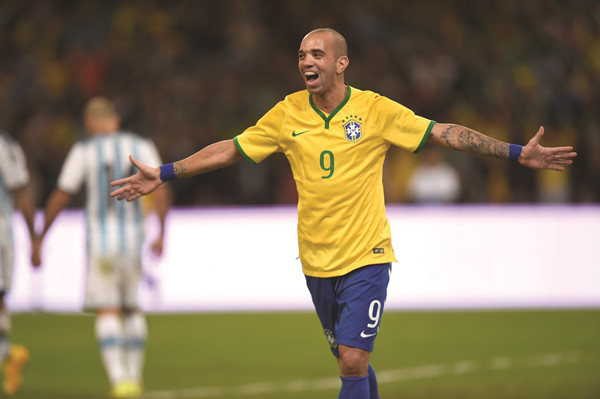Brazilian soccer stars prosper in China
 |
|
Brazil's Diego Tardelli celebrates his goal during a friendly match against Argentina in Beijing, Oct 11, 2014. Guo Yong / Xinhua |
Striker Diego Tardelli became the first Brazilian national team player to be selected from a Chinese team after Brazil coach Dunga announced his squad for friendlies against France and Chile later this month.
The 29-year-old Tardelli, who recently switched from Atletico Mineiro to Shandong Luneng with a transfer fee of 5.5 million Euros, has reunited with his former Atletico head coach Cuca at his new club.
While a number of Brazilian coaches have been drafted into China to train players at all age levels, Dunga believes that we will soon see an increase in Brazilian players heading to Asia as well.
"It's the economic landscape of globalised soccer," Dunga said at a press conference in Rio de Janeiro on March 5.
"Europe has countries that can no longer afford to buy Brazilian players, and China is investing heavily in soccer. And not just in players," Dunga added. "They have many Brazilian coaches too."
According to statistics released by Germany's Transfer Market when the Chinese winter transfer window closed, the Chinese Super League, which will start this week, spent a record 108 million Euros to buy players and coaches on the 2014/2015 transfer market.
The Chinese league, which has been professional for only 20 years, stands second to only the English Premier League in terms of the money spent on transfers, topping most of the top-flight leagues around the world.
During the shopping spree, Brazilian players or players from Brazilian league accounted for the most high-profile and pricey transfers, with Chinese clubs involved in at least three of the five biggest trades.
Besides Tardelli, former Brazilian league MVP Dario Conca returned to China and joined Shanghai SIPG club after only one year at Brazilian club Fluminense. He had three successful seasons with Chinese champions Guangzhou Evergrande. The 31-year-old was said to be unhappy at Fluminense due to payment issues.
However, Conca is no longer the focal point, as his then record transfer fee of 9.1 million Euros was topped by Evergrande's recent payment of 15 million Euros for Brazil international’s Ricardo Goulart and 11 million Euros for prolific Brazilian striker Alan from Austria's Red Bull Salzburg.
According to Brazilian newspaper Folha de Sao Paulo, the Chinese Super League, for the first time in history, has become the league spending the most money to buy players from the Brazilian league.
The Chinese league spent 37.65 million Euros in its purchase of six players from Brazil. In the past, European clubs from Portugal, Spain, Germany and Italy were the major buyers of Brazilian players.
Players from Brazil have caused a scoring storm in the Chinese Super League in recent years. Spearheaded by South American attacking trio Conca, Muriqui and Elkeson, Guangzhou Evergrande clinched China’s first ever Asian Champions League title in 2013. Meanwhile, half of last season’s top 10 scorers were from Brazil, as more and more Chinese clubs pursue players from Brazil.
Cuca, who moved to China after guiding Atletico Mineiro to their first ever Libertadores Cup in 2012, said working conditions in China are light years ahead of even the biggest Brazilian clubs.
Compared with the struggling economic situation in Brazil, the huge salaries offered by Chinese clubs are an irresistible factor.
"I am getting four times what I got at Sao Paulo," Aloisio, Shandong's Brazilian winger, said in an interview with Reuters. "It was an offer I couldn't turn down, it was my future and the future of my family."
Even more attractively, unlike in Brazil where there are always delays in salary payment, Chinese clubs pay the players on time and foot their tax bills.
"In Brazil, almost a third goes to taxes and it is difficult to get paid," Cuca said. "In China you are guaranteed to get your money on time. I'm not going to lie — I came here firstly to ensure my financial independence."
Before Tardelli and Goulart moved to China, the two Brazilian internationals were warned that they may suffer the consequences of playing in the Far East. However, Tardelli's inclusion in Dunga's latest squad refutes the worries that Asia-based players would be overlooked.
"We have Brazilian professionals working in all those countries," said Dunga.
Though China's investment in soccer soars, its competitive level still needs to be developed as China has only reached the World Cup finals once, in 2002. With the arrival of high-profile players and coaches, the Chinese league is attracting more and more attention and boosting the development of Chinese soccer.


















